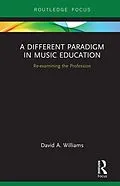A Different Paradigm in Music Education is a "let's consider some possibilities" book. Instead of a music methods book, it is a look at where the music education profession is and how music teachers might improve what it is we do. It is about change. It is about questioning the current music education paradigm, especially regarding its exclusive role as the only model. The intent is to help pre-service and in-service music educators consider new modes of pedagogical thought that will allow us to broaden our reach in schools and better help students develop as creative musicians across their lifespan.
The book includes an overview of several opportunities and course examples that would make music education more relevant and meaningful, especially for students that are not interested in our traditional performance offerings. The author wishes to stimulate discussions, with the goal for the music education profession to grow and mature.
Autorentext
David A. Williams is an Associate Professor of Music Education at the University of South Florida. In addition to a variety of graduate classes, he teaches Foundations of Music Education and Progressive Music Methods to undergraduate music education students. He joined the faculty at USF in the fall of 1998, and he holds a Ph.D. in music education from Northwestern University. His research interests involve the use of learner-centered pedagogies and how these impact teaching and learning in music education.
Klappentext
A Different Paradigm in Music Education is a "let's consider some possibilities" book. Instead of a music methods book, it is a look at where the music education profession is and how music teachers might improve what it is we do. It is about change. It is about questioning the current music education paradigm, especially regarding its exclusive role as the only model. The intent is to help pre-service and in-service music educators consider new modes of pedagogical thought that will allow us to broaden our reach in schools and better help students develop as creative musicians across their lifespan.
The book includes an overview of several opportunities and course examples that would make music education more relevant and meaningful, especially for students that are not interested in our traditional performance offerings. The author wishes to stimulate discussions, with the goal for the music education profession to grow and mature.
Inhalt
Preface
Introduction
Chapter 1 - Philosophic Thoughts and Questions
- Change
- What is Music?
- Why is Music Important?
- What is it a musician can do?
- What should be the goals of music education?
- Why does 'doing music' look so different outside the schools?
- What are the challenges ahead for music education?
Chapter 2 - History and Traditions
- Introduction
- Singing Schools
- Common Schools
- Secondary Schools
- Music Conferences and Projects
- Young Composers Project
- Contemporary Music Project
- Yale Seminar on Music Education
- The Manhattanville Music Curriculum Program
- Tanglewood Symposium
- The Goals and Objectives Project
- Federal Government and Education
- The Present
- Introduction
- Musical Culture in the U. S.
- Music Technology Changes
- School Change
- Music Education Elephants
- Traditional Ensembles
- Introduction
- Class Size
- Student Autonomy
- Musical/Creative Decisions
- Formal Concerts
- Instruments
- Musical Styles and Ensembles
- Traditional Notation
- Lifelong Skills
- Entry Level
- Developing Functionality
- Guitar Class
- Tablet Based Performance Class
- Music Technology Class
- Music Production
- Recording Arts
- Internet Based Music Class
- An Additional Possibility
Chapter 3 - Societal Change
Chapter 4 - Opportunities for Change
Chapter 5 - Beyond Band, Choir, and Orchestra
Chapter 6 - Closing Thoughts
Index
